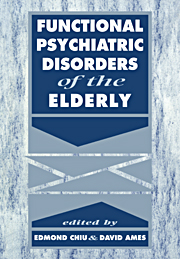Book contents
- Frontmatter
- Contents
- List of contributors
- Preface
- Introduction – A personal note
- Acknowledgement
- Part 1 Classification
- Part 2 General epidemiology
- Part 3 Neuroses
- Part 4 Affective disorders
- Part 5 Psychosexual disorders
- Part 6 Substance use and abuse
- Part 7 Schizophrenia and related psychoses
- Part 8 Psychological, biological and medical issues
- Part 9 Treatment methods
- Part 10 Conclusion
- Index
Introduction – A personal note
Published online by Cambridge University Press: 13 November 2009
- Frontmatter
- Contents
- List of contributors
- Preface
- Introduction – A personal note
- Acknowledgement
- Part 1 Classification
- Part 2 General epidemiology
- Part 3 Neuroses
- Part 4 Affective disorders
- Part 5 Psychosexual disorders
- Part 6 Substance use and abuse
- Part 7 Schizophrenia and related psychoses
- Part 8 Psychological, biological and medical issues
- Part 9 Treatment methods
- Part 10 Conclusion
- Index
Summary
This book originates in Australia, but it is of international significance. Deriving from a World Psychiatric Association meeting hosted in Melbourne, this is no mere text of conference proceedings; Edmond Chiu and David Ames have used the theme of that conference as the basis for a carefully planned series of commissioned contributions to a well-structured book.
The early years of psychogeriatrics were dominated, rightly and inevitably, by the ‘Everest of dementia’. It is evidence of the maturity and confidence of this branch of psychiatry (now an official subspecialty in the United Kingdom) that it here steps back from its concern with the insistent burden of the organic psychosyndromes, and focuses on the hugely important functional disorders of old age. Dementia in its most obvious manifestations obtrudes itself in a way which is hard (though too often still not impossible) to ignore; the sometimes more personal misery of functional mental disorders is too easy to overlook, or to confront inadequately amid the pressure of the needs of sufferers from the organic disorders and those who look after them.
Yet there were times when it was to functional illness that most of the attention of those working in the field of old age mental disorder was being given; prognosis here is generally better, the course often (not always) shorter, and the gratifications of successful treatment more direct.
- Type
- Chapter
- Information
- Functional Psychiatric Disorders of the Elderly , pp. xxi - xxivPublisher: Cambridge University PressPrint publication year: 1994

